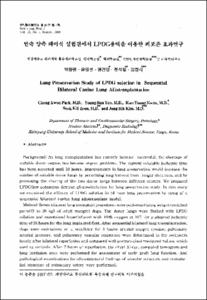연속 양측 폐이식 실험견에서 LPDG용액을 이용한 폐보존 효과연구
- Keimyung Author(s)
- Park, Chang Kwon; Yoo, Young Sun; Kwon, Kun Young; Zeon, Seok Kil; Kim, Jung Sik
- Department
- Dept. of Thoracic & Cardiovascular Surgery (흉부외과학)
Dept. of Pathology (병리학)
Dept. of Nuclear Medicine (핵의학)
Dept. of Radiology (영상의학)
Institute for Medical Science (의과학 연구소)
- Journal Title
- Keimyung Medical Journal
- Issued Date
- 1999
- Volume
- 18
- Issue
- 1
- Abstract
- Background: As lung transplantation has recently become successful, the shortage of suitable donor organs has become urgent problems. The current tolerable ischemic time has been accepted until 10 hours. Improvements in lung preservation would increase the number of suitable donor lungs by permitting lung harvest from longer distances, and by promoting the sharing of the two donor lungs between different centers. We prepared LPDG(low potassium dextran glucose)solution for lung preservation study. In this study we examined the efficacy of LPDG solution in 24-hour lung preservation by using of a sequential bilateral canine lung allotransplant model.
Method: Seven bilateral lung transplant procedures were performed using weight-matched pairs(23 to 26 kg) of adult mongrel dogs. The donor lungs were flushed with LPDG solution and maintained hyperinflated with 100% oxygen at 10℃ for a planned ischemic time of 24 hours for the lung implanted first. After sequential bilateral lung transplantation, dogs were maintained on a ventilator for 3 hours: arterial oxygen tension, pulmonary arterial pressure, and pulmonary vascular resistance were determined in the recipients hourly after bilateral reperfusion and compared with pretransplant-recipient values, which used as controls. After 2 hours of reperfusion, the chest X-ray, computed tomogram and lung perfusion scan were performed for assessment of early graft lung function. And pathological examinations for ultrastructural findings of alveolar structure and endothelial structure of pulmonary artery were performed.
Results: Five dogs of seven experiments had successfully finished the whole assessments after bilateral reperfusion for three hours. Arterial oxygen tension in the recipients was markedly decreased in immediate reperfusion period hut gradually recovered after reperfusion for three hours. The pulmonary arterial pressureand pulmonary vascular resistance showed singificant elevation (p<0.05 versus control values) but also recovered after reperfusion for three hours (p<0.05 versus immediate period value). The ultrastructural findings of alveolar structure and endothelial structure of pulmonary artery showed reversible mild injury in 24 hours of lung preservation and reperfusion.
Conclusions: The present study suggests that LPDG solution provide excellent preservation and transplanted lung function after 24 hours of preservation in a canine model in which the dog is completely dependent on the fuction of transplanted lung.
- Alternative Title
- Lung Preservation
Study of LPDG solution in Sequential Bilateral Canine Lung Allotranplantation
- Publisher
- Keimyung University School of Medicine
- Citation
- 박창권 et al. (1999). 연속 양측 폐이식 실험견에서 LPDG용액을 이용한 폐보존 효과연구. Keimyung Medical Journal, 18(1), 89–100.
- Type
- Article
- Appears in Collections:
- 2. Keimyung Medical Journal (계명의대 학술지) > 1999
1. School of Medicine (의과대학) > Dept. of Nuclear Medicine (핵의학)
1. School of Medicine (의과대학) > Dept. of Pathology (병리학)
1. School of Medicine (의과대학) > Dept. of Radiology (영상의학)
1. School of Medicine (의과대학) > Dept. of Thoracic & Cardiovascular Surgery (흉부외과학)
3. Research Institutues (연구소) > Institute for Medical Science (의과학연구소)
Items in Repository are protected by copyright, with all rights reserved, unless otherwise indicated.
